Related Research Articles

The American Revolution was an ideological and political revolution that occurred in British America between 1765 and 1791. The Americans in the Thirteen Colonies formed independent states that defeated the British in the American Revolutionary War (1775–1783), gaining independence from the British Crown and establishing the United States of America, the first modern constitutional liberal democracy.

Conscription, sometimes called the draft in the United States, is the mandatory enlistment of people in a national service, most often a military service. Conscription dates back to antiquity and it continues in some countries to the present day under various names. The modern system of near-universal national conscription for young men dates to the French Revolution in the 1790s, where it became the basis of a very large and powerful military. Most European nations later copied the system in peacetime, so that men at a certain age would serve 1–8 years on active duty and then transfer to the reserve force.

The Distinguished Service Medal (DSM) is a military decoration of the United States Army that is presented to soldiers who have distinguished themselves by exceptionally meritorious service to the government in a duty of great responsibility. The performance must be such as to merit recognition for service that is clearly exceptional. The exceptional performance of normal duty will not alone justify an award of this decoration.

The French Revolution was a period of radical political and societal change in France that began with the Estates General of 1789 and ended with the formation of the French Consulate in November 1799. Many of its ideas are considered fundamental principles of liberal democracy, while phrases like Liberté, égalité, fraternité reappeared in other revolts, such as the 1917 Russian Revolution, and inspired campaigns for the abolition of slavery and universal suffrage. Its values and the institutions it created dominate French politics to this day.

Henry V, also called Henry of Monmouth, was King of England from 1413 until his death in 1422. Despite his relatively short reign, Henry's outstanding military successes in the Hundred Years' War against France made England one of the strongest military powers in Europe. Immortalised in Shakespeare's "Henriad" plays, Henry is known and celebrated as one of the greatest warrior kings of medieval England.

The Battle of the Somme, also known as the Somme offensive, was a battle of the First World War fought by the armies of the British Empire and French Third Republic against the German Empire. It took place between 1 July and 18 November 1916 on both sides of the upper reaches of the Somme, a river in France. The battle was intended to hasten a victory for the Allies. More than three million men fought in the battle and one million men were wounded or killed, making it one of the deadliest battles in human history.
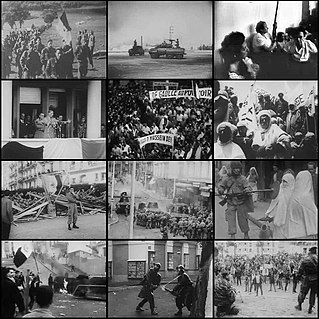
The Algerian War, also known as the Algerian Revolution or the Algerian War of Independence, and sometimes in Algeria as the War of 1 November, was fought between France and the Algerian National Liberation Front from 1954 to 1962, which led to Algeria winning its independence from France. An important decolonization war, it was a complex conflict characterized by guerrilla warfare and the use of torture. The conflict also became a civil war between the different communities and within the communities. The war took place mainly on the territory of Algeria, with repercussions in metropolitan France.

The French Third Republic was the system of government adopted in France from 4 September 1870, when the Second French Empire collapsed during the Franco-Prussian War, until 10 July 1940, after the Fall of France during World War II led to the formation of the Vichy government.

The French Army, officially the Ground Army to distinguish it from the French Air and Space Force, is the land-based and largest component of the French Armed Forces. It is responsible to the Government of France, along with the other four components of the Armed Forces. The current Chief of Staff of the French Army (CEMAT) is General Thierry Burkhard, a direct subordinate of the Chief of the Defence Staff (CEMA). General Burkhard is also responsible, in part, to the Ministry of the Armed Forces for organization, preparation, use of forces, as well as planning and programming, equipment and Army future acquisitions. For active service, Army units are placed under the authority of the Chief of the Defence Staff (CEMA), who is responsible to the President of France for planning for, and use of forces.
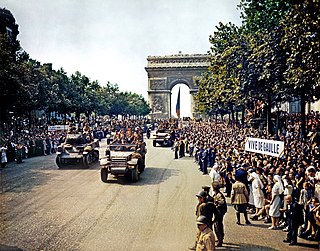
The liberation of Paris was a military battle that took place during World War II from 19 August 1944 until the German garrison surrendered the French capital on 25 August 1944. Paris had been occupied by Nazi Germany since the signing of the Second Compiègne Armistice on 22 June 1940, after which the Wehrmacht occupied northern and western France.

Oveta Culp Hobby was the first secretary of the U.S. Department of Health, Education and Welfare, first director of the Women's Army Corps, and a chairperson of the board of the Houston Post.

The Women's Army Corps (WAC) was the women's branch of the United States Army. It was created as an auxiliary unit, the Women's Army Auxiliary Corps (WAAC) on 15 May 1942 by Pub.L. 77–554, and converted to an active duty status in the Army of the United States as the WAC on 1 July 1943. Its first director was Oveta Culp Hobby, a prominent woman in Texas society. The WAC was disbanded in 1978, and all units were integrated with male units.

Edith Nourse Rogers was an American social welfare volunteer and politician who served in the United States Congress. She was the first woman elected to Congress from Massachusetts. Until 2012, she was the longest serving Congresswoman and was the longest serving female Representative until 2018. In her 35 years in the House of Representatives she was a powerful voice for veterans and sponsored seminal legislation, including the Servicemen's Readjustment Act of 1944, which provided educational and financial benefits for veterans returning home from World War II, the 1942 bill that created the Women's Army Auxiliary Corps (WAAC), and the 1943 bill that created the Women's Army Corps (WAC). She was also instrumental in bringing federal appropriations to her constituency, Massachusetts's 5th congressional district. Her love and devotion to veterans and their complex needs upon returning to civilian life is represented by the Edith Nourse Rogers Memorial Veterans Hospital in Bedford Massachusetts that is named in her honor.
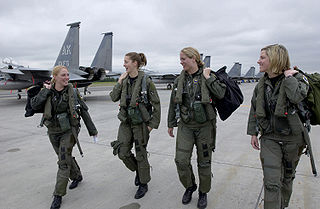
Women have served in the military in many different roles in various jurisdictions throughout history. Women in many countries are no longer excluded from some types of combat mission such as piloting, mechanics and infantry officer. Since 1914, in western militaries, women have served in greater numbers and more diverse roles than before. In the 1970s, most Western armies began allowing women to serve in active duty in all military branches. In 2006, eight countries conscripted women into military service. In 2013, Norway became the first NATO country to draft women, as well as the first country in the world to conscript women on the same formal terms as men. In 2017, neighboring Sweden followed suit and in 2018, the Netherlands joined this line-up.
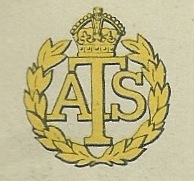
The Auxiliary Territorial Service was the women's branch of the British Army during the Second World War. It was formed on 9 September 1938, initially as a women's voluntary service, and existed until 1 February 1949, when it was merged into the Women's Royal Army Corps.

Châtel-Guyon is a commune in the Puy-de-Dôme department in Auvergne-Rhône-Alpes in central France.
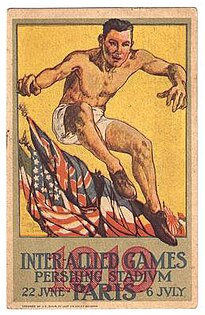
Stade Pershing was a multi-purpose stadium in the Bois de Vincennes in Paris, France. It was used mostly for football matches and hosted the final of the Coupe de France on four occasions. It hosted the Inter-Allied Games in 1919 and the first Women's World Games in 1922. It also hosted some of the football matches during the 1924 Summer Olympics. The stadium was able to hold 29,000 spectators at its height; it opened in 1919 and closed in 1960. Its area currently hosts baseball games.
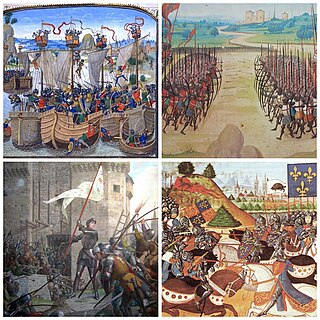
The Hundred Years’ War was a series of armed conflicts between the kingdoms of England and France during the Late Middle Ages. It originated from disputed claims to the French throne between the English royal House of Plantagenet and the French royal House of Valois. Over time, the war grew into a broader power struggle involving factions from across Western Europe, fueled by emerging nationalism on both sides.

The United States declared war on Germany on April 6, 1917, nearly three years after World War I started. A ceasefire and Armistice was declared on November 11, 1918. Before entering the war, the U.S. had remained neutral, though it had been an important supplier to the United Kingdom, France, and the other powers of the Allies of World War I.

As Allied troops entered and occupied German territory during the later stages of World War II, mass rapes of women took place both in connection with combat operations and during the subsequent occupation of Germany. Scholars agree that the majority of the rapes were committed by Soviet occupation troops. The wartime rapes were followed by decades of silence.
References
- ↑ A Companion to Women's Military History (History of Warfare)